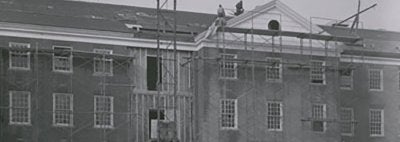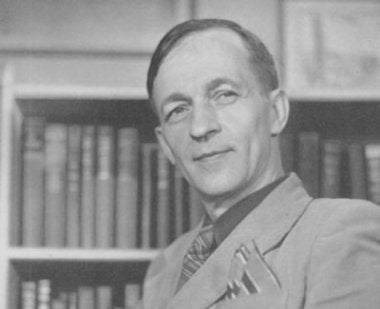

Dean Benjamin

Born on March 27, 1893, in Gilmanton, Wisconsin, Dr. Harold R.W. Benjamin was an educator, writer and an innovative thinker.
After earning degrees from the University of Oregon and Stanford University, he became professor of education and assistant dean of the University of Minnesota College of Education in 1931. While at Minnesota, he wrote the landmark book, “The SaberTooth Curriculum,” under the pen name of J. Abner Peddiwell. “The Saber-Tooth Curriculum” is considered a classic work that illustrates how unexamined traditions of schooling can result in resisting needed change. The satirical book presents a series of lectures by Professor Peddiwell on the topic of stoneage education.
On September 1, 1939, Dr. Benjamin became the third dean of the College of Education at the University of Maryland. He served as dean of the college from 1939 to 1942 and then again from 1947 to 1952.
In between his tenures as dean, Dr. Benjamin served as a Lieutenant Captain in the Intelligence Division of the Army Air Corps during WWII. In 1946, he directed the international educational relations of the U.S. Office of Education. A member of the U.S. delegation that drafted the charter for the United Nations Educational, Scientific and Cultural Organization, he was credited with the phrase: “Wars begin in the minds of men.”
During his many years as COE dean, Dr. Benjamin achieved a number of accomplishments. He oversaw the creation of master’s programs in adult education, educational administration and supervision, guidance and personnel, and comparative education; and the first two doctoral degrees: Doctor of Philosophy and Doctor of Education. He helped establish the education honor society Phi Delta Kappa. Notably, he developed University of Maryland University College, which became the overseas program for military personnel, a major innovation in higher education.
A trailblazer of his time, Dr. Benjamin was known for his forward-thinking approach to education and did not shy away from controversy. During his time in Oregon, he battled the Ku Klux Klan, which had politically dominated Oregon and had taken over the local school board, by lessening their influence over a series of elections.
Under Dr. Benjamin’s leadership as the dean, Daniel Prescott of the Institute for Child Studies coordinated the effort to deliver masters education courses to African American graduate students at Bowie State Teachers College. That same year, Edna McNaughton launched the University Nursery, which preceded the Center for Young Children.
In 1950, the American Council on Education called for regional conferences to discuss discrimination in education. Dr. Benjamin represented UMD at a conference held at American University. When asked about what role education plays in fighting discrimination and advancing opportunities for students of color, Dr. Benjamin said he believed that education could be the key.
“We have to fight these problems with education—a special kind of education aimed at adults. Education must give us the necessary marksmanship to shoot down these enemies,” Dr. Benjamin said.
After leaving UMD, Dr. Benjamin continued in higher education. He also made annual reviews of educational systems in Latin American countries, and in 1960- 61 he visited colleges and universities throughout Latin America to compare them to North American education systems. He led several educational study groups including missions to Asia.
During his career, Dr. Benjamin wrote many books including, “Higher Education in the American Republics.” A collection of his writings, “Waken: The Spirit of Harold Benjamin,” was published in 1968.



